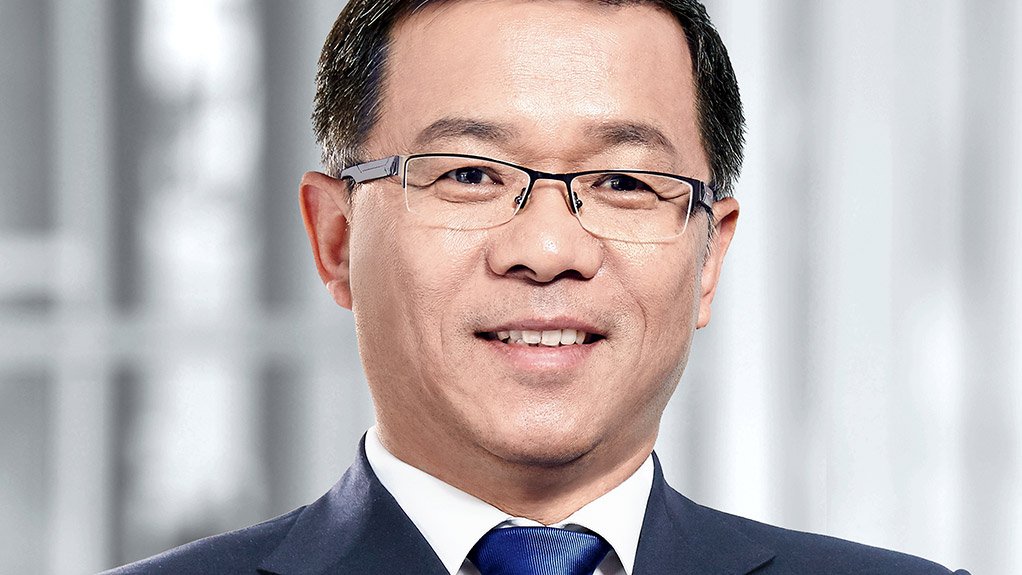Emerging markets using latest energy technologies to improve competitiveness


CHUNYUAN GU Natural resources, accessible labour and more readily available energy can be leveraged to grow industry in Africa, if industrial operations become more efficient
With the advent of new energy generation, storage and management technologies, developing-country companies are using the capabilities of new integrated microgrid systems to improve their efficiency and lower costs, says electrical equipment and services multinational ABB Asia, Middle East and Africa president Dr Chunyuan Gu.
The use of integrated renewable energy systems creates new demand for and consumption of electricity, which is also changing the way electricity is consumed within companies and industries.
“Renewable energy sources and new energy mixes are increasingly recognised as being commercially viable. Microgrids can provide affordable and reliable power in areas where utilities are not present or supply unreliable power.”
Additionally, these integrated and often automated electricity networks are also being used to make electricity accessible to regions that are historically energy scarce. In Africa, modern, mixed electricity systems are being used by industries and mines, often in remote locations.
“New electricity designs and capabilities are also enabling better use and processing of natural resources within countries, as the availability and affordability of mixed energy networks facilitate greater local beneficiation.”
Specifically in Africa, companies are deploying renewable-energy systems and advanced industrial energy management systems to reduce the costs of electricity use, particularly the cost to run diesel generators as backup power or as their main power source, says Gu.
“Further, the way in which people and companies add value is changing with the introduction of digital industrial technologies. While manufacturing execution systems and analytics are well established and mature in industry, the combination of vast amounts of data and the direct links with suppliers and customers will enable tremendous value to be created and added rapidly,” he notes.
Industries and countries are aiming to improve their technology framework. The Fourth Industrial Revolution, being driven by the increasing integration of digital technologies within and beyond the factory floor, is equally relevant within developed and emerging markets, says Gu.
Particularly in Africa, the combination of natural resources, accessible labour and more readily available energy can be leveraged to grow industry, but only if industrial operations, processes and manufacturing production can be made more efficient. Thereby, the value of products that can be produced can be increased and companies and regions can move higher up the value chain and gain a better share of the profits.
“By leveraging new industrial and energy technologies, resource-rich countries can reduce dependence on the export of raw and semiprocessed commodities, grow their ability to add greater value to products within their economies and produce higher-value goods and materials for export or to substitute imports.”
However, the main constraint is the changing skills requirement, rather than any physical or technical barriers, which hampers transitions to new technologies. As part of this trend, most industrial companies are also aware of the need to retrain key staff and already have in place continuous skills development programmes to ensure that their personnel can effectively use and manage the new technologies.
As a wave of new Fourth Industrial Revolution innovations continues to shape industries, companies across the world, including those in emerging markets, are using new industrial and energy systems and approaches that are more efficient and provide greater control and visibility over productive assets and resources, concludes Gu
.
Article Enquiry
Email Article
Save Article
Feedback
To advertise email advertising@creamermedia.co.za or click here
Press Office
Announcements
What's On
Subscribe to improve your user experience...
Option 1 (equivalent of R125 a month):
Receive a weekly copy of Creamer Media's Engineering News & Mining Weekly magazine
(print copy for those in South Africa and e-magazine for those outside of South Africa)
Receive daily email newsletters
Access to full search results
Access archive of magazine back copies
Access to Projects in Progress
Access to ONE Research Report of your choice in PDF format
Option 2 (equivalent of R375 a month):
All benefits from Option 1
PLUS
Access to Creamer Media's Research Channel Africa for ALL Research Reports, in PDF format, on various industrial and mining sectors
including Electricity; Water; Energy Transition; Hydrogen; Roads, Rail and Ports; Coal; Gold; Platinum; Battery Metals; etc.
Already a subscriber?
Forgotten your password?
Receive weekly copy of Creamer Media's Engineering News & Mining Weekly magazine (print copy for those in South Africa and e-magazine for those outside of South Africa)
➕
Recieve daily email newsletters
➕
Access to full search results
➕
Access archive of magazine back copies
➕
Access to Projects in Progress
➕
Access to ONE Research Report of your choice in PDF format
RESEARCH CHANNEL AFRICA
R4500 (equivalent of R375 a month)
SUBSCRIBEAll benefits from Option 1
➕
Access to Creamer Media's Research Channel Africa for ALL Research Reports on various industrial and mining sectors, in PDF format, including on:
Electricity
➕
Water
➕
Energy Transition
➕
Hydrogen
➕
Roads, Rail and Ports
➕
Coal
➕
Gold
➕
Platinum
➕
Battery Metals
➕
etc.
Receive all benefits from Option 1 or Option 2 delivered to numerous people at your company
➕
Multiple User names and Passwords for simultaneous log-ins
➕
Intranet integration access to all in your organisation



















